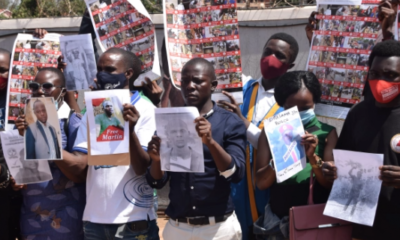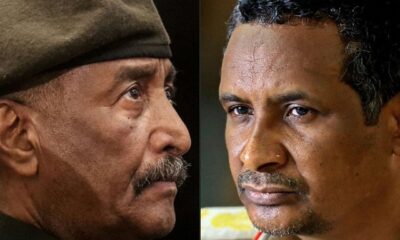
Activists leverage short films to spotlight sexual and reproductive health justice in Uganda
Reach a Hand Uganda and Sauti Plus Media Hub have premiered a series of eight powerful short films aimed at promoting Sexual and Reproductive Health Rights and Justice (SRHRJ) in East Africa.The films, which include both fiction and documentary formats, are part of the “Get Reel” project, an initiative supported by Docubox, an East African documentary film organization, with backing from the Hewlett Foundation and the Wellsprings Philanthropic Fund.The collection features diverse titles such as Unasemaje (fiction), Unyagoni (documentary), Before Sixteen (documentary), Detour (fiction), Jimbi (fiction), Sukari (fiction), 1992 (fiction), and Red Line (documentary).Each film was crafted to address the often overlooked but urgent issues surrounding SRHRJ in the region, reflecting the filmmakers’ immersion in discussions and news about sexual and reproductive health rights.During the premiere at the International University of East Africa, Teddy Chimulwa, National Project Officer at UNESCO Uganda, highlighted the critical role of storytelling in driving advocacy.“These films are more than entertainment; they are tools for advocacy designed to reach policymakers, community leaders, and citizens to raise awareness and encourage action on SRHR issues that affect Africa, particularly Uganda,” Chimulwa stated.She emphasized the need for a shift in how sexual and reproductive health is approached, citing stagnant teenage pregnancy rates in Uganda—24%, down only slightly from 25% in 2016—and ongoing challenges such as unplanned pregnancies, unsafe abortions, and gender-based violence.“We know that by raising awareness, breaking taboos, and encouraging people to seek support, we can change these realities,” Chimulwa added.Chimulwa also underscored the importance of African stories being told by Africans through creative mediums like film, music, and art.“It’s vital that young people use their creativity and talent to highlight issues that matter to them in authentic ways,” she noted, reaffirming UNESCO’s commitment to supporting young people in using media and storytelling to create positive social change.The UNESCO official further called on policymakers and health practitioners to invest in platforms that empower young people to voice their concerns about sexual and reproductive health.Benson Muhindo from Reach A Hand Uganda stressed the value of film as a tool for changing narratives around SRHRJ.“We have embraced film as a means to help audiences go beyond understanding SRHR issues and toward seeking justice. Many young people face these issues silently, unaware of the legal protections available to them,” Muhindo explained.“These films demonstrate that young people do not need to suffer in silence; they are a powerful medium that deserves support.”By using storytelling to tackle pressing social issues, these films aim to inspire action, foster understanding, and promote justice across East Africa, ultimately contributing to a healthier and more equitable society.https://www.ugbulletin.co.ug/activists-leverage-short-films-to-spotlight-sexual-and-reproductive-health-justice-in-uganda/
News
Ugandan Citizen Abducted, Held in Secret Detention for Three Months, Sparks Outrage and Calls for Justice

A disturbing new case of unlawful detention has surfaced, highlighting the ongoing human rights crisis in Uganda. A Ugandan citizen was reportedly abducted and held in a secret facility, known as a “safe house,” for three months, only to be released without charge or explanation. This incident, reported by NTV Uganda, has sparked widespread condemnation and renewed calls for accountability regarding human rights abuses in the country.
While the details surrounding the abduction remain unclear, reports indicate that the individual was taken without due process and held incommunicado—an action that has long been condemned by human rights organizations. The victim’s release, with no charges filed and no clear justification, has angered activists and citizens, who view this as yet another case of egregious abuse of power by the state.
“This is a recurring pattern,” said one human rights activist. “Abductions, secret detentions, and unexplained releases have become all too common in Uganda. These acts violate fundamental human rights and erode public trust in the justice system.”
The use of “safe houses,” unregistered detention facilities reportedly operated by security forces, has been a focal point in numerous allegations of torture and illegal imprisonment. Despite repeated calls from both local and international organizations for their closure and accountability for those involved, little action has been taken to address these violations.
This case underscores the urgent need for reform within Uganda’s security apparatus and greater accountability for human rights abuses. Observers hope that drawing attention to these injustices will spur concrete action to bring those responsible to justice and ensure the protection of basic human rights.
As frustration mounts, calls for both domestic and international pressure to hold the government accountable for such crimes grow louder. “One day, there must be accountability for all these crimes against our people,” stated one social media user, reflecting the sentiments of many Ugandans.
News
NUP Gathering Disrupted: Kyagulanyi Alleges Security Force Harassment and Arrests

National Unity Platform (NUP) President Robert Kyagulanyi has accused Ugandan security forces of using excessive force to disrupt a planned NUP gathering. The allegations were detailed in a statement shared on Twitter, following an event held to honor children of NUP supporters who were killed, disappeared, or detained for their political beliefs.
According to Kyagulanyi, security personnel, under the command of an officer identified as Asiimwe, carried out a preemptive operation early in the morning upon learning of the NUP’s plans. The forces allegedly stormed the premises, arrested workers, and deployed tear gas to disperse those present.
“The criminals under the command of one Asiimwe deployed early morning, arrested our workers, and threw tear gas into our premises. They’ve cordoned off the premises and blocked all people from accessing the place,” Kyagulanyi wrote.
Among those reportedly arrested were Saava Peter, Mudenya Samson, and Turyasingura Samson. Kyagulanyi claimed the detained workers were subjected to beatings and interrogated about their political affiliations, with security operatives labeling them as terrorists.
“These JATT operatives asked the workers who they support politically, branding them terrorists and criminals—their only crime being that they work with us. You can imagine the indignity!” Kyagulanyi lamented.
This incident adds to the growing tension in Uganda’s political climate, where opposition parties frequently accuse the government of stifling dissent. Despite the challenges, Kyagulanyi ended his statement with a message of defiance and optimism, proclaiming, “UGANDA WILL BE FREE.”
NUP Gathering Disrupted: Kyagulanyi Alleges Security Force Harassment and Arrests
News
Sudan Demands Apology from Uganda Over Army Chief Muhoozi Kainerugaba’s Threat to Invade Khartoum

Sudan has demanded an official apology from Uganda over “offensive and dangerous” comments made by the chief of Uganda army staff, who threated to invade Khartoum, the Sudan Tribune has reported.
General Muhoozi Kainerugaba, son of Ugandan President Yoweri Museveni and CDF of the Ugandan army, posted two comments on the X platform on Tuesday in which he threatened “to capture Khartoum” with the support of the US President elect Donald Trump after he takes office. The posts were deleted later.
“The government of Sudan demands and official apology from the Ugandan government for the offensive and dangerous comments of the army commander,” Sudan’s foreign ministry said in a statement that the Sudan Tribune said it has seen.
Sudan Demands Apology from Uganda Over Army Chief Muhoozi Kainerugaba’s Threat to Invade Khartoum









